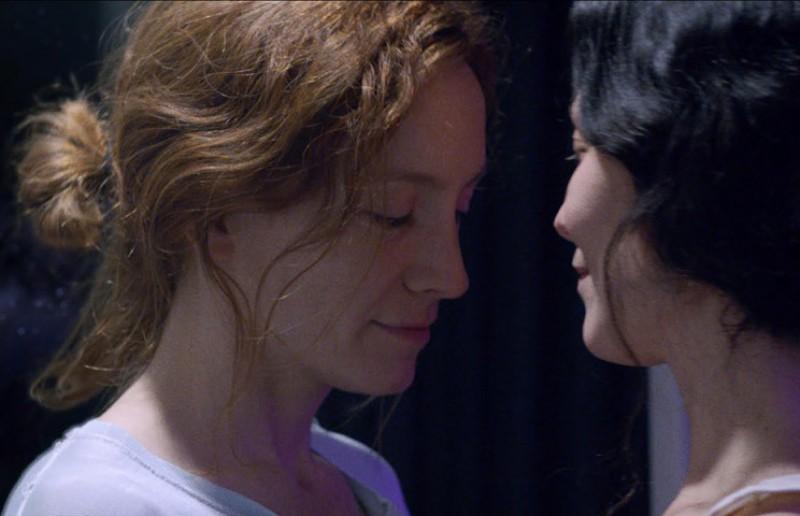 Image
Image
Meet Pella Kgerman, the co-director of ANIARA
One of the more unique titles at this years Toronto International Film Festival is the science-fiction epic ANIARA, co-directed by Pella Kgerman and Hugo Lilja. Made with modest means and a surplus of ingenuity, ANIARA is based on a 1956 epic poem by Swedish Nobel Prize winner Harry Martinson and details what happens after we destroy our planet and seek refuge elsewhere. Harrowing and sobering in its portrait of what human beings are capable of, ANIARA constantly surprises. Its part of a string of intelligent, off-genre pictures from Sweden such as Ali Abbasis Cannes hit Border, also screening at this years Festival which are built around issues and which ask probing, disturbing questions.
Kågerman spoke to TIFF about how to hack a Scandinavian ferry into a spaceship, and the challenges of filming a “no-set sci-fi” on a budget. ANIARA, a part of Discovery, will screen at the 43rd Toronto International Film Festival on September 7, 9, and 15.
How did you find Aniara : En revy om människan i tid och rum, the poem that the film is based on?
In Sweden, it’s hard to not know about it. Harry Martinson, the author, was a Nobel Prize winner, and our parents’ generation was forced to read it in school. Even if you weren’t required to read it, you always knew about it. Several operas and plays have been based on it, but this is the first film adaptation.
What drew you to it?
I grew up with my grandmother, and she was very playful and interested in literature. We often role-played books we had read, even when I got older. We once went to see a play of Aniara, and the night after she got a stroke. I started to read the book aloud to her at the hospital. As she was getting better, we started to role-play it and pretend that the hospital was the spaceship Aniara, where every doctor and patient was its passengers. Granny herself played the role of the computer called Mima, and I think she did it really well — very confused and subtle. One funny anecdote from that rather sad episode was that Granny kept calling me “the Minister,” from another book we had read, so everyone in her ward thought I was a priest. (Laughs)
The film is very female-centred, which feels rare for a genre film. The action focuses on a woman and her relationship with another woman, and even her best friend, the Astronomer, is an older woman (another sci-fi rarity).
The main character’s gender is not one hundred percent clear in the book, although the assumption is, of course, a man. But we love our female lead and always had her in mind for the role. The Astronomer was probably supposed to be a man, too. That’s the character we have developed the most on our own, but she is also the one speaking most of the writer’s language.
There’s a lot of material in the film that feels very contemporary — particularly around the environment — for a story adapted from a 1956 publication. How much was changed from poem to film in the adaptation process?
It was all in the book, although the story took place in a far future after several new ice ages — that, we edited out. We wanted it to be set today. The book was written during the height of the Cold War, so there are a lot of passages that refer to nuclear bombs, which we didn’t focus on as much, even if it feels highly relevant again. The author himself called the book a “Cassandra prophecy,” and I think it definitely still is.
The film rather beautifully satirizes our lack of curiosity. I love the fact that the crew just abandons that obelisk when it doesn't do what they assumed it would.
I do believe that people, in general, are more curious than they are on-board Aniara, and sexually, there is still some curiosity left on-board, I must say... But as time passes by, the depressive numbness hits most of the people on-board. I guess curiosity, in some way, is closely connected to hope.
How did you approach creating the great sense of claustrophobia in the film?
We were depressed and used that! (Laughs) No, but to some extent we actually did. But practically, all the scenes in the pilot’s cabin are shot on a Scandinavian ferry, going back and forth between Stockholm and Åland, in a storm. It wasclaustrophobic — for real. After two days, everyone on the team couldn’t stand the buffet any longer. Imagine, then, to be stuck on Aniara for the rest of your life!
I love the set. It may be the best use of a shopping mall as a metaphor since the original Dawn of the Dead. What were the challenges of creating these sets and effects on a low budget?
To be honest, we couldn’t afford to do it the other way around and build everything from scratch. So we had this idea of a “no-set sci-fi,” where we avoided studio sets as much as possible. This was both a decision made based on our budget and an aesthetic choice.
Time also lays a carpet over everything we create; it’s unavoidable. For example, all the sci-fi films from the ’60s look very much like the ’60s, even if they’re trying to depict the future. It’s better, then, to be pragmatic and realistic. In our case, we really wanted to create a “here and now” feeling to the ship. We wanted it to feel familiar. If we were to emigrate in large scale to Mars today, we’re pretty sure that the ships will contain shopping malls, bowling alleys, and spas.
But especially shopping malls.
Text: TIFF
Interviewer: Steve Gravestock
Images: TIFF
Top Headlines
-
Entertainment
Losing out to Spectacles
February 27, 2026
-
Entertainment
Rani Mukerji returns as fearless cop Shivani Roy in Mardaani 3 watch Babbar Sherni song!
January 20, 2026
-
Entertainment
Bollywood 2025: Hits, Hype and Heartbreaks as Dhurandhar Redefines the Year
December 24, 2025
-
Entertainment
Rotary Club of Calcutta East Central celebrates centenary of iconic actor Santosh Dutta with statue unveiling
December 04, 2025
-
Entertainment
Valentyn Vasyanovychs To The Victory! wins 2025 TIFF Platform Award unanimously
September 26, 2025
-
Entertainment
Chlo Zhaos Hamnet Wins TIFF 2025 Peoples Choice Award
September 20, 2025
-
Entertainment
Sholay: Golden even after fifty years
July 04, 2025
-
Entertainment
War 2: Check out Hrithik Roshan, Jr NTR and Kiara Advani's new posters
June 26, 2025
-
Entertainment
LGBTQIA+: Icelandic film Odd Fish and Brazil's Baby win big at KASHISH 2025 film festival
June 12, 2025
-
Entertainment
Katrina Kaif named Maldives tourism global brand ambassador ahead of Modi's visit
June 10, 2025


